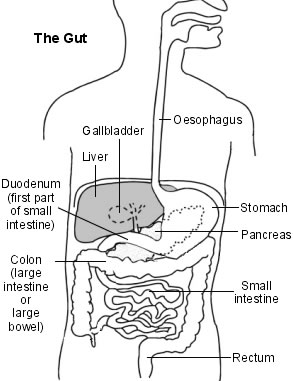Other Ways to Get Rid of IBS Naturally – More Facts!
How to get rid of IBS naturally? Doctors believe that some appropriate dietary changes can help improve the symptoms. There are also some alternative treatments, such as herbs, hypnosis, acupuncture, etc. Unfortunately, there is still no scientific publication about the effectiveness of these treatments in treating IBS. Nevertheless, some patients do turn to them for help!
Though you can find some common suggestions of foods you need to avoid you need to take a trial process before finding the appropriate diet that works best!
What actually is irritable bowel syndrome (IBS)? Sometimes we call it as ‘Spastic colon’ or ‘Spastic colitis’ or ‘Irritable colon’ or even ‘Mucous-colitis‘!
So as the name suggests, it is a kind of disorder that affect the colon (large intestine). Chronic abdominal pain, diarrhea, constipation, bloating, and gas are some common symptoms associated with irritable bowel syndrome.
Irritable bowel syndrome is a chronic condition, which is also a lifelong condition. It can impair your daily routines, reducing your productivity.
Though there is no cure, the symptoms are controllable. With healthy living (particularly such as appropriate diet, regular exercise, and stress management) and other appropriate strategies, it’s likely to be a managable condition.
You can plan ahead for any activity that you want to do. When driving, make sure you map the route so you know the locations of bathroom when you have to go for bowel movements. Wake up earlier if you think that your spastic colon can make you late to work … Etc!
In addition, the good news it doesn’t lead to serious changes /inflammation in bowel tissue! In other words, it is less severe than other intestinal diseases such as Crohn’s disease & ulcerative colitis. It doesn’t increase the risk of bowel cancer and doesn’t lead to blockages of the intestine or other serious conditions.

What you eat does affect the way of how you deal with the syndrome. Some foods may provoke the symptoms so you need to avoid them. So diet is crucial.
To help understand diet for IBS, here are a few checklists to remember!
For IBS with diarrhea, appropriate diet plays a key role to ease the symptom.
But when it also causes constipation, the treatment can be more challenging and you should not only focus on your diet – other strategies (such as stress management, physical therapies or other complementary therapies) are also necessary to help provide a relief.
What common culprits in diet to avoid? First off, you need to clearly understand that each individual is unique. The foods that trigger your symptoms may be slightly different with other patients.
But in general some common culprits include alcohol, caffeinated tea /coffee, spicy foods, trans-fat (fried foods), and foods that contain high fat should be avoided by patients with spastic colitis.
What else? Foods that cause excess gas and minor abdominal discomforts also should be avoided. These include bagels, peas, broccoli, beans, onions, cauliflower, sprouts, cabbages, and Brussels.
Yes it does. The symptoms are more likely to occur at stressful period. Furthermore, many studies have confirmed that there is a connection between the mind and the gut, and this link is real [reference].
So, it’s important to manage your stress! A lot of anecdotal reports show that stress plays a role to keep the IBS symptoms off..
Again, you need to completely understand that you cannot find one-size-fits-all-diet, because in fact the best diet for people with spastic colon is commonly highly individualized.
However, there are some parameters that can be used for a general guide. Several years ago, experts believed that a high-fiber diet was the best choice. But some new studies found that it doesn’t work for everyone. It may help treat constipation, but it’s also potential to trigger other symptoms (like bloating gas and abdominal cramping).
To keep safe, it is much better to get fiber from your diet in moderation then increase it gradually until you find the level of how far you should go. But the challenging thing is how to do it safely!
According to WebMD, men can try about 38 grams of fiber a day, and 25 grams for women. We should consume as much dietary fiber as we can tolerate. Ask your doctor for in-depth information!
Choose smaller meals instead of larger meals! This idea is good to reduce the risk of abdominal discomforts after meals and may also help you to find and identify specific foods that trigger your symptoms.
In addition, eating too late at night should be avoided. Don’t forget to sit down when eating and chew the food as well!
As the name suggests, it is a kind of diet that skipping gluten. There is opinion that gluten-free diet may help treat IBS naturally – is it true?
Again, the answer varies from patient to patient. Some people with spastic colon may find improvement with gluten-free diet, but in fact there are also many patients who don’t notice any difference.
If you wonder whether or not it can help improve your IBS, consult first with your GP /doctor, particularly if you are also ongoing with FODMAPS diet (a specific diet to analyze the effects of five major forms of carbohydrates “galactans, fructans, sugar alcohols, fructose, and lactose” on IBS symptoms).
Different kinds of carbohydrate may cause different symptoms of IBS. Milk sugar or lactose is probably the main culprit. Some people with spastic colon often experience abdominal pain and bloating gas after consuming lactose.
Yes, there are several choices – but again the effectiveness also varies from patient to patient. What are they? Evening primrose oil, fish oil, and borage oil are some popular choices.
Some patients report that these oils can help manage their stress and improve some IBS symptoms (such as bloating, discomfort, and abdominal pain – particularly during menstrual period). However, the side effects such as rashes, mild headache, and stomach upset may occur – according to a report published by the University of California.
There are some alternative treatments for irritable bowel syndrome, but which one that actually works? The following are pieces of information about them.




